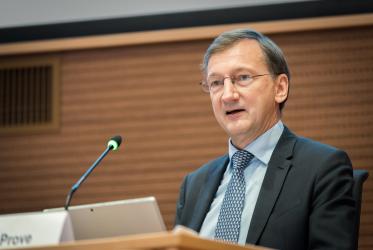Conference of the Initiative of the Custodian of the Two Holy Mosques for Inter-Religious Dialogue and its Impact in Disseminating Human Values
30 September to 1 October 2009
by
Rev. Dr Samuel Kobia
General Secretary
World Council of Churches
Geneva, Switzerland
30 September 2009
Your eminences, your excellencies, honourable participants, dear esteemed guests,
I take pleasure in greeting you on this beautiful autumn day when we all may delight in the marvels of Creation and the possibilities open to us as co-inhabitants of our earth that we hold in trust on behalf of future generations. To our Muslim brothers and sisters, I extend congratulations on the recent celebration of Eid al-Fitr; to our Jewish friends, I offer every good wish at the dawn of this new-year; and to all, I give thanks for your participation in this conference.
I especially thank the organizers of this initiative toward fostering dialogue and disseminating such values as justice, peace and community. I congratulate the Custodian of the Two Holy Mosques of Islam, King Abdullah Ibn Abdul Aziz Al-Saud, for the creative and humanitarian impulse that has led us here today.
I welcome you to Geneva on behalf of the World Council of Churches, an international organization of 349 Christian churches, and therefore the largest and most comprehensive Christian churches organization in the world. As visitors may have noticed, this is a place that in 2009 is celebrating the 500th birthday of a religious leader – John Calvin. Geneva is sometimes called "the City of Calvin", and he had a great impact in making this place a refuge from persecution. Geneva is also the city of subsequent reformers and philanthropists who have acted from religious motivations in striving for a more humane world. This year has marked the 150th anniversary of a key moment in the life of Henry Dunant, a 19th-century believer and businessman from Geneva whose writing and organizing led to the First Geneva Convention and to the founding of the International Red Cross-Red Crescent.
Geneva has become famous as a host of dialogues. It was the home of the League of Nations and has become a centre for the work of many United Nations agencies, non-governmental organizations and charitable foundations with a heart for unity.
The World Council of Churches is based in Geneva and promotes the visible unity of Christian churches. Over the decades we have learned something about dialogue from the experience of encouraging exchanges and common ministries among hundreds of churches. Our members live in very different social, cultural and political settings and understand their faith through a variety of confessional lenses. Yet, despite our differences, we share a longing for unity in faith, witness and service to the world.
Nearly forty years ago, the World Council of Churches began a systematic exploration of inter-religious dialogue. Many of our churches have long histories of engagement with neighbours of other faiths and ideologies. Others have been more hesitant to meet openly with representatives of communities that did not share their beliefs. As a World Council, we have seen our role as facilitating inter-religious dialogue in given local or national situations. We try to apply principles we have learned from dialogue among Christians to the broader conversations that are taking place among men and women of many religions.
From the perspective of the World Council of Churches, inter-religious and other inter-cultural dialogue is based on mutual respect and furthers mutual understanding. Each partner in dialogue acknowledges the sincerity of others' convictions, and the process rejects the practice of one group "talking about" others, providing instead a context where all may "talk with" one another.
Genuine dialogue implies the recognition of, and respect for, differences. Because we are different, we each have something unique to contribute, and every contribution counts. At the same time, dialogue partners seek to discover and appreciate the common values held by all. A fruitful mutual understanding depends on honesty: both convergences and genuine differences must be recognized and held in a creative tension.
We believe that conflicts involving religious and cultural differences are not an expression of an inevitable "clash of civilizations". On the contrary, we believe that dialogue can lead to a vision of justice and peace that is grounded in all our traditions. When we dialogue in good faith the difference becomes a blessing and leads to mutual enrichment.
All religions worthy of the name are concerned with the wholeness of life. This includes a transcendental dimension but also a practical duty to treat one's neighbour as one would wish to be treated. In this sense, dialogue is not merely a subject for discussion in conferences or councils but a way of living out our faith in relation to one another. In loving and serving the God we know, we find our common calling to affirm human dignity, uphold human rights, preserve the environment and bring warfare to an end – not least among the religious and political complexities of the Middle East.
It is in this spirit and conviction that we welcome the initiative of His Majesty King Abdullah Ibn Abdul Aziz Al Saud, supporting his call to a constructive dialogue among followers of all religions and civilizations, seeking effective means of disseminating such human values as justice, truth, peace, reconciliation and community, and affirming that our differences must not lead to conflict and confrontation, for what unites us is greater than what divides us.
May the blessing of Almighty God be upon this assembly, and may you prosper in the pursuit of true dialogue.


